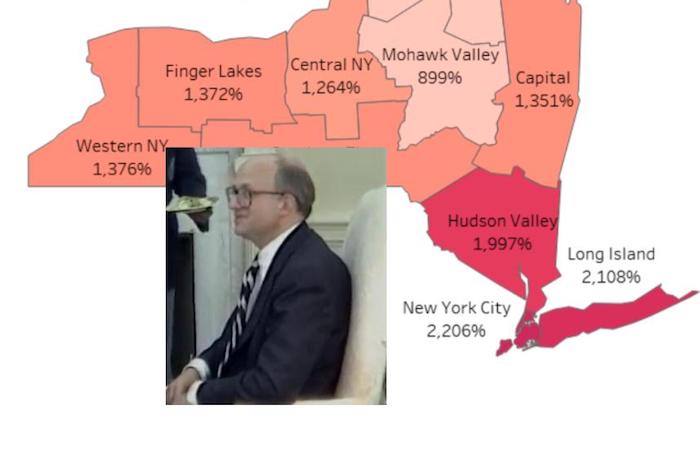
The grim unemployment numbers illustrate part of the story – April 2021 will expose another part; a wrongheaded policy. That’s when the millions of New Yorkers receiving unemployment insurance benefits (UI) will be faced with one of UI’s absurd and counter-intuitive realities – the money is taxable by the federal and state governments. But with unemployment now at levels not seen since the Great Depression, it’s long past time for that policy to end.
More than 35 million people nationwide are now unemployed, and the numbers only account for those who’ve succeeded in filing applications due to inadequate, outdated, and over-burdened state systems, including New York’s.
Maximum weekly UI benefits vary from state to state: from $190 in Puerto Rico to $823 in Massachusetts; in New York the current weekly benefit ranges from $104 to $504 for 26 weeks (New York State Department of Labor). The simple fact is that UI isn’t enough to live on. Sure, the $600 per week (for up to four months) emergency pandemic-benefit is a step in the right direction, but it’s only temporary and doesn’t address the system’s serious shortcomings or its castigatory basic assumptions.
Under normal circumstances, a New Yorker eligible for the maximum, is looking at $2016 a month. And that’s true whether single, married, or head of household. Out of that you’ve got to come up with rent or mortgage, utilities, food, health insurance, and job-hunting expenses. The average monthly rent in New York City is just under $3,000. And while rents outside the five boroughs are somewhat lower, you’d be hard pressed to find rents under $2,000 near most of the state’s major cities.
So not only doesn’t UI even come close to providing a viable stop-gap, you have to somehow make up a significant shortfall. That means going into savings and non-401K retirement funds, borrowing from relatives and friends, or resorting to credit cards. And that assumes any of those options are available to you. Under normal circumstances, you can’t tap the 401K, if you have one, to tide you over; unemployment is not one of the hardships defined by the IRS for early withdrawal without a penalty.
 CityViews are readers’ opinions, not those of City Limits. Add your voice today!
CityViews are readers’ opinions, not those of City Limits. Add your voice today!
Federal withholding on UI is a flat 10 percent, so if you elect to have federal and state withholding taxes subtracted from your weekly benefit you’re left with even less.
The consequences of not having taxes withheld can result in owing money to the IRS and New York State after coming out of a period of unemployment when most can least afford it. And prolonged periods of unemployment, like the one we’re facing now, will force people into a downward spiral of IRS and state tax penalties, interest, payment plans, and other kinds of debt. It’s a recipe for financial disaster that has a negative impact on everyone, except the bankruptcy industry.
But UI wasn’t always taxable.
When it was made law as part of President Franklin D. Roosevelt’s Social Security Act (SSA) in 1935 during the Great Depression, it was intended to give people a vital lifeline and wasn’t taxed. It was a policy decision that made sense.
In 1979 UI became taxable above a certain level of overall annual income, and with the Tax Reform Act of 1986, one of President Ronald Reagan’s signature pieces of legislation it was made fully taxable.
Why the change?
During the 1970s, some conservative-leaning think tanks indicated that UI was a deterrent to finding a new job; that notion was popularized by Martin Feldstein, Reagan’s chief economic advisor and sold to legislators.
Other studies showed the opposite. Unemployment insurance, as stingy as it is, prevents people from sinking into greater poverty and keeps money circulating within the economy.
But it’s the conservative viewpoint that has driven policy and it makes no sense.
Right-wing pundits even took Feldstein’s assertions further by making the demonstrably false claims that UI recipients lived in luxury on government handouts, even going so far as to declare that they deliberately quit jobs for free money.
Of course we know that UI is not a handout; it’s funded through a joint federal-state program of payroll taxes paid for by employers. Nonetheless taxing it treats the unemployed like slackers out to rip off taxpayers.
It’s long past time to return to SSA’s original intent; Congress and states must end this policy now.
Toni L. Kamins is a freelance writer in New York City.








One thought on “Opinion: Stop Taxing Unemployment Benefits”
I’ve been collecting unemployment since April 2020. I made sure to have my taxes withheld, and chose the ONLY option presented to me for NY State taxes: 2.5%
I just did my taxes, and while I got a federal refund, I OWE New York State $1,400 because apparently as a NYC resident, 2.5% doesn’t cover my NYC local taxes AT ALL.
This is not mentioned ANYWHERE on the NYD Department of Labor website nor the NYS Department of Taxation. In fact, I am commenting on this article 7 months after it was written, because there is NO information anywhere on the internet regarding this discrepancy. Beyond the ridiculous factor of paying taxes on unemployment to begin with, now I’m hit with a tax bill after not having worked for 10 months.
Please write about this!